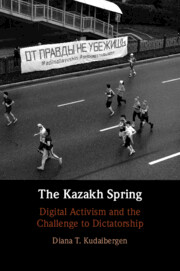Book contents
- The Kazakh Spring
- The Kazakh Spring
- Copyright page
- Dedication
- Contents
- Figures
- Tables
- Acknowledgements
- Introduction
- 1 What Is the Kazakh Spring?
- 2 Who Are Oyan, Qazaqstan?
- 3 Deconstructing Vlastʼ
- 4 Performing the State, Performing the Protest
- 5 Generation Q and Decolonizing Alash
- 6 The Public Square and the Body under Authoritarian Pressures
- 7 Queering the Public Sphere
- 8 Making Sense of the Bloody January 2022 Mass Protests
- Conclusions
- References
- Index
7 - Queering the Public Sphere
Published online by Cambridge University Press: 16 May 2024
- The Kazakh Spring
- The Kazakh Spring
- Copyright page
- Dedication
- Contents
- Figures
- Tables
- Acknowledgements
- Introduction
- 1 What Is the Kazakh Spring?
- 2 Who Are Oyan, Qazaqstan?
- 3 Deconstructing Vlastʼ
- 4 Performing the State, Performing the Protest
- 5 Generation Q and Decolonizing Alash
- 6 The Public Square and the Body under Authoritarian Pressures
- 7 Queering the Public Sphere
- 8 Making Sense of the Bloody January 2022 Mass Protests
- Conclusions
- References
- Index
Summary
This chapter picks up the discussion on gendered violence and gendered order established by the Nazarbayev regime. Never before did any movement pay so much attention to this agenda. Never before in the contemporary history of Kazakhstan did protest movements call out openly on double oppression of the regime – through its patriarchal and authoritarian nature of governing. In this chapter, I also focus on the ideas of class, inequality, and transnational dialogue of Oyan, Qazaqstan and Qazaq Koktemi with other protest movements in the world. Dwelling further on my argument about Qazaq Koktemi representing the fading of the post-Soviet era, I also analyse in detail the 8 March 2021 Women’s Rally in Almaty and the many actors united behind its call for de-Sovietizing and de-stereotyping this vital day of mobilization. I believe that the 2021 Women’s March opened many eyes to the fact that there is a vibrant plurality of views and activist forms within Qazaq Koktemi and that these forms are no longer chained by the old paradigms of the ‘gender’ question in Nazarbayev’s terms, with the tokenization of female politicians and persistent sexism in the political domain.
Keywords
- Type
- Chapter
- Information
- The Kazakh SpringDigital Activism and the Challenge to Dictatorship, pp. 220 - 243Publisher: Cambridge University PressPrint publication year: 2024

